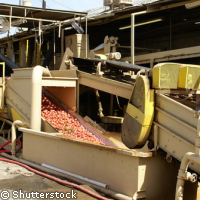New shelf life for food ideas
Almost since the beginning of human evolution, people have been searching for ways to preserve food, from smoking meat to the invention of the humble tin can. These innovations and others like them have revolutionised the way people eat. With current technological advancements, food scientists are still looking at ways to revolutionise the way we store our food. Consumers are inundated on a daily basis with facts regarding the food they eat. Europeans are now more aware of the cultural role of food in everyday life, and food scientists must design technology that helps people get what they want from their food. It's under this intense public scrutiny that scientists recently presented their findings at a recent European Science Foundation (ESF) and European Cooperation in the field of Scientific and Technical Research (COST) conference. While in the past, the major concern for scientists was the 'use by' date, nowadays the brief has expanded. 'Europeans want food that is cheap, convenient, high quality, safe and more and more produced in an eco-friendly way,' explains Professor Brian McKenna, a food scientist at University College Dublin in Ireland. In addition, Professor McKenna thinks that food plays a variety of roles in European society nowadays. 'Food is important to people's health as it is increasingly being linked to diseases such as obesity, coronary heart disease and diabetes,' he says. The conference was attended by 75 scientists and policymakers from 22 countries and was one of the series of research conferences organised by the ESF/COST Forward Look initiative. Forward Look, a flagship instrument of the ESF, allows scientists to meet people with policy experience and to help set priorities for future research. A multidisciplinary joint ESF/COST initiative, Forward Look involves the ESF Standing Committee for Life, Earth and Environmental Sciences, the ESF European Medical Research Councils, the ESF Standing Committee for the Humanities, the ESF Standing Committee for the Social Sciences and the COST Domain Committee for Food and Agriculture. While increased interest over food can deliver more choice for consumers, it has also led to some misinformed debates. And Europeans have resisted many potentially useful technologies over unsubstantiated fears that they are not safe. According to Professor McKenna, 'Nowadays, the public are much more sceptical, particularly when it comes to food'. In particular, he cites the example of using irradiation to kill pests and increase the shelf life of mushrooms. But this process is confined to only a few countries within Europe, such as the Netherlands, despite a considerable amount of evidence that it is safe for humans. Professor McKenna hopes that by understanding socioeconomic, political, and cultural influences on what Europeans eat, food scientists will be able to better advise policy-makers about how food should be processed and packaged, and how it is sold and eventually eaten.



